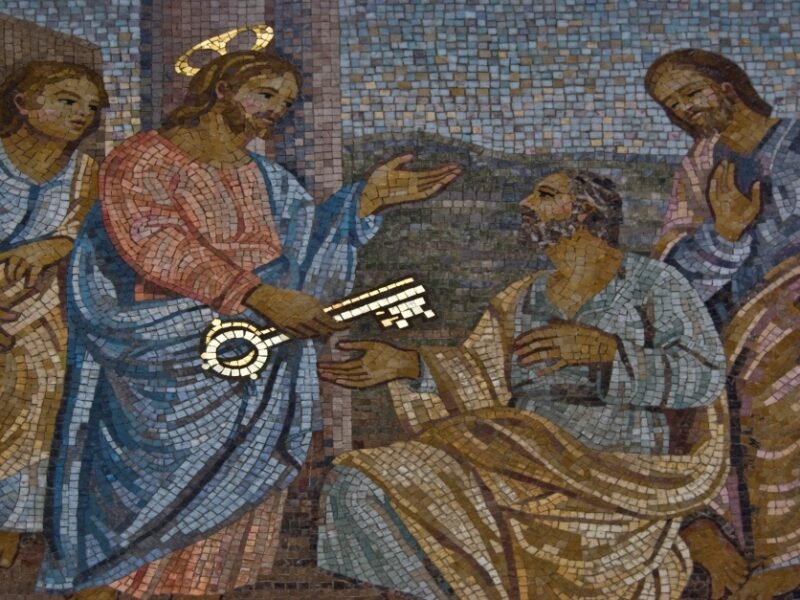I began my sacramental education in a rural Baptist church. There, every service ended with an altar call. Music plays as the pastor waits expectantly to receive anyone who is ready to make a decision to follow Christ. The decision, once made, indicates salvation. The rite is so important, that no Baptist pastor would dare to eliminate it–the salvation of souls, after all, is primary aim of pastoral ministry. I had been a baptized believer since age seven, baptized in the name of the Father and of the Son and of the Holy Ghost by W.A. Criswell of First Baptist Church in Dallas. This was a week after a distressed conversation in the parking garage with my father. I was afraid to be separated from him and my mother in hell, and I had just come to grasp that the pastor’s warnings applied to me just as well as anyone else in the congregation. Encouraged by my father, I took my life into my own hands and handed it over to Jesus as best I knew how. Approaching the altar and baptismal on that day was a thrill that banished fear and was full of comfort that the Lord recognized me, saw me, and the assurance that after this once-for-all event I would no longer be alone. “Once saved, always saved” the mantra went.
And yet, sitting at the altar call, the desire to go forward never fully left me. Sitting quietly with the congregation as I did weekly–“every head bowed, every eye closed”–something tugged at me, telling me that I should not remain in my seat. This was when the fear set in. If I was being drawn again to the altar then perhaps my salvation had not really “took” the first time. I was young after all. Sin remained a part of my life. Knowing as we did that no rite could guarantee salvation–only the sincerity of the heart–perhaps my baptism had only added up to the impression of salvation. One thing I knew for sure was that if there was even a question that God was drawing me to him, then it would be the safe thing to go. Alone, I would walk to the altar. I did this many times. Our gentle pastor unfailingly treated me with a bemused kindness and during the course of my elementary and middle school years, I was “saved” several times over. Ringing in my head was the only soteriology I knew by heart: DC Talk’s In The Light
What’s going on inside of me?
I despise my own behavior
This only serves to confirm my suspicions
That I’m still a man in need of a Savior
Each Sunday’s “once-for-all” call for sincere conversion put it to me that the situation was dire: no outward sign could be trusted to confirm salvation, but many could be produced to disclose an unregenerate soul. Frightened, I would approach the front, hoping that it would “take” this time. The day after a particularly tearful conversion, I heard the frustration in my father’s voice: “Listen son, you’re a Christian. I know you are. I was there when you prayed. The very fact that you want to be saved means something.” My dad knew that something was up. Indeed, he had felt it himself. Not long after, he stumbled into a Catholic parish where worshippers had just begun Eucharistic adoration. Bowled over and weeping, he told me later, he knew that what was on the altar was a gift from God and that we needed it. The Lord’s Supper had been an inoffensive, if puzzling appendage to Baptist worship, but here it was a source of real spiritual sustenance. After conversations with the priest there and much reading, he resolved to not go another week without the Eucharist. Eventually, all of our family followed him.
In the end, it was the Anglican Church who would give it to us without the addition of needless obstacles. In it, I was surprised to find every essential feature of my Baptist heritage amplified. The scripture was held up and read aloud. We confessed our sins together. And there at the end of the service was an altar call. In many respects it was the same sort of altar call I had always known: I rose and went up with the same gnawing need for salvation. But the differences were vital. I was no longer alone, but walked together with a throng. Instead of going up alone, the whole congregation had deemed itself unworthy, and rose along with me. The altar had a kneeling rail, and a place for my outstretched hands (my approach was expected!). And here at this altar the Lord himself met me, accepted me, fed me with his body and blood, and promised to keep me in everlasting life. Above all, the Church did not rebuke the form my Baptist faith had taken, instead she enfleshed it. I had not been wrong to desire to approach the altar again and again. All that was needed was for the Lord to truly meet me there.
I reflect on my conversion frequently. It buoys me as I journey further up and further into the Great Tradition. Today I am a priest, teaching the doctrines I received and dispensing the sacraments I once craved. I share it here to bring up a central fact that has become quite important to me: that the Anglican tradition is not in the first place, a matter of style. It is a faithful custodian of realities. The sacraments and the Word preached according to the apostolic wisdom of the Great Tradition have such power that even the traditions that have denied them retain their shades. The Church herself became an objective thing that took a distinct shape. It is not just a gathering of similarly inclined people of faith. Though I grew up only in the shadows of the mysteries–denied their substance–it was these resonances that helped me know what it was that I truly lacked. I was not converted by good liturgy, theology, antique beauty, or the thrill of performing ancient rites. Whatever goods these things may bring to common worship and whatever nobility they may lend to our dessicated culture, they can do no better than to call the faithful to the altar; to point a young boy to where he may receive the real body of his Lord, and how he may be kept in everlasting life.






'Altar Call' have 2 comments
August 1, 2019 @ 8:56 am Altar Call | The North American Anglican – The Anglophilic Anglican
[…] Source: Altar Call | The North American Anglican […]
August 5, 2019 @ 9:06 am Cynthia L Erlandson
Very good article. I had a similar experience of growing up with thinking that fear, not joy, was what was supposed to accompany Communion.